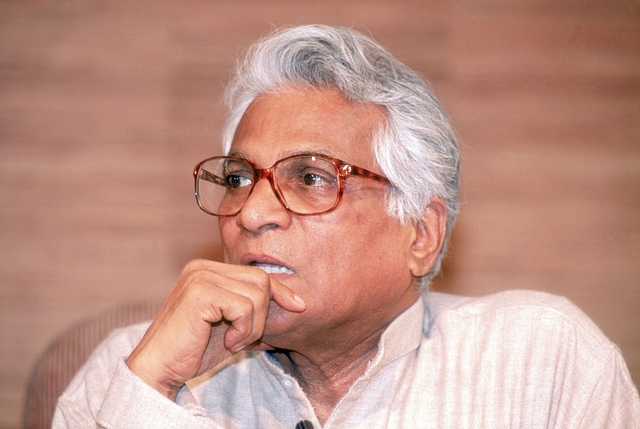
The Long-Standing Rift Between George Fernandes And Congress
How Congress and its leaders hounded Fernandes for opposing the party’s policies.
Former Union minister and Janata Party stalwart George Fernandes passed away in New Delhi on 29 January. Apart from being a fearless critic of the Emergency, he was also known for the running battle he waged against the Congress and its leaders.
One of the least-known facts about his battle against the Congress was how he opposed India joining the General Agreement on Trade and Tariffs (GATT) that finally led to the formation of the World Trade Organization (WTO) in 1995. The reason for Fernandes opposing India joining the GATT and then WTO was that he was of the firm view that the Indian government under the late Rajiv Gandhi had succumbed to pressure from Europe and the US in altering its tough stance during the Uruguay round of GATT negotiations.
Fernandes made no effort to hide his displeasure on India diluting its stance. He often publicly stated that Rajiv Gandhi had succumbed to Western pressure that threatened to reveal the secrets of Bofors scam and diluted the country’s stand.
His stand was more or less reflected in what Sukhamoy Chakravarty, Chair Professor, Centre for Economic Studies and Planning, School of Social Sciences, Jawaharlal Nehru University, wrote in an editorial in The Hindu.
Chakravarthy wrote:
As the Bofors scam unraveled in 1987-88, India’s international standing plummeted. The GATT Uruguay round of negotiations was at a crucial stage with India acting as the leader of developing countries in negotiating with the advanced countries. India’s stand softened perceptibly at that time. Consequently, in 1999, in Seattle, India was not trusted by other developing countries.
Writing on the 'Genesis of GATS’ (General Agreement on Trade in Services) in the European Journal of International Law, Juan A Marchetti and Petros C Mavroidis, said that when the world community of nations met at Punta del Estate in Uruguay for GATT talks, secret negotiations were held in Geneva between India, Brazil and Europe. This led to separation of talks on GATT and GATS, as initially efforts were on to have both agreements done at one time.
Though there have been a couple of references that highlighted a “sudden turnaround” in India’s stand on the Uruguay round of talks on GATT, these have always avoided the reasons that forced India to dilute its stance. Fernandes’ allegation, possibly, led to India taking a tough stand during the Seattle WTO Ministerial Conference in 1999 when India, leading the G-70 Group of developing nations’ concerns, said it would not be willing to go forward on its commitments until the developed nations fulfilled their commitments. The Seattle conference ended in a deadlock.
As the defence minister in the Atal Bihari Vajpayee government, Fernandes chose to give prominence to khadi in Defence Ministry offices. Khadi was chosen for interior decorations, particularly for curtains.
Fernandes was of the view that khadi weavers were producing quality products but they were seldom given their due. He even chose Khadi boots for the India Army soldiers guarding the snow-clad borders.
“These boots produced by Khadi Gram Udyog workers are of great quality. We have found them to be really good and they will be used by our jawans guarding at higher altitudes,” he told the media in 1998, on the sidelines of an event in Delhi’s Pragati Maidan.
The fact that he ordered two defence procurement officials to go to Siachen, for their role in the delay of procurement of snow scooters that were required by the soldiers there, is part of folklore now. As the defence minister, he visited the Siachen glacier nearly 30 times to get a firsthand experience of the trying conditions Indian soldiers were working in the area.
During the Kargil War, he wanted martyred Indian soldiers to be treated with honour. This resulted in the Defence Ministry purchasing caskets from US firm Buitron and Baiza. The issue here was India looked for immediate purchase of the caskets. In the global market, when you look to buy a product off-the-shelf for immediate use, you will have to pay a premium given the fact that you need it immediately unless and until the seller is in need of liquidity. And when India is involved, the global market knew that it is in for a windfall. This led to the Comptroller and Auditor General finding faults with the purchase of these caskets. It said the procurement had led to a loss of $187,000.
It led to Sonia Gandhi, the then Congress president, calling him kafan chor (coffin thief). The Central Bureau of Investigation (CBI) filed a case in August 2009 but it was dismissed by the special CBI court as no evidence was found against the accused. The Congress party always nurtured a grievance against Fernandes and had tried to pin some indiscretion to him, on more than one occasion. It also got a case filed against Fernandes, former naval chief Sushil Kumar and a few others in 'Barak missile deal’.
The charges against Fernandes and others were that they had received Rs 2 crore bribe in the Rs 1,150 crore deal. The case ended on 1 February 2017 after the CBI told the special court judge that none of the allegations against the accused were substantiated.
It was unfortunate that Fernandes was not even aware of this exoneration as he was bedridden. The late leader might be called an eternal fighter but the tragic aspect of his life was he was always hounded by the Congress. The party and its leaders, starting from Indira Gandhi, never seemed to have forgiven him for his role during the Emergency. It began by targeting him with the Baroda dynamite case, accusing him of conspiring to plant explosives in government offices and followed until he fell sick and became bedridden a few years ago.